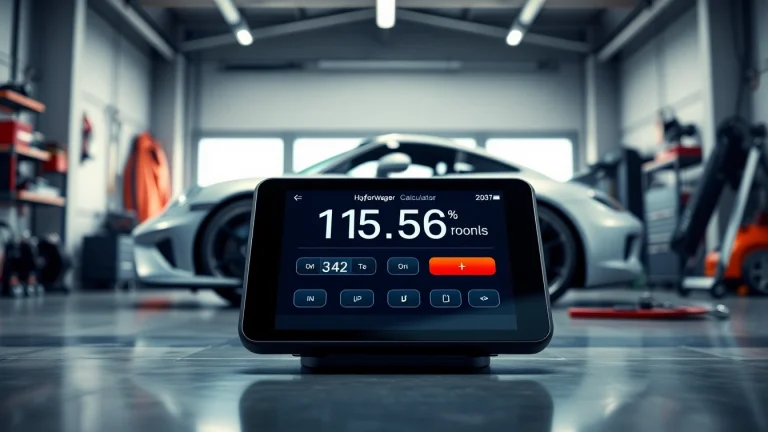
Accurate Horsepower Calculator for Every Engine – Unlock Your Vehicle’s Performance
Understanding Horsepower: What It Is and Why It Matters
Horsepower is a crucial measurement in the automotive and mechanical industries, defining the power output of engines, motors, and other mechanical devices. Understanding this unit of power is essential for anyone interested in vehicle performance, whether you’re a car enthusiast, a mechanic, or simply a curious consumer. In this comprehensive guide, we’ll explore the intricacies of horsepower and how you can practically apply this knowledge using a Horsepower Calculator.
The Definition of Horsepower
The term “horsepower” was coined in the late 18th century by engineer James Watt, who sought to compare the output of steam engines with the power of draft horses. One horsepower is typically defined as 746 watts of electrical power. This measurement allows for consistency across varying types of engines and machinery, providing a clear understanding of performance capabilities. In essence, horsepower quantifies how quickly work can be done, with higher numbers indicating a greater power output over time.
Importance of Accurate Power Measurements
Accurate power measurements are vital for engineers, designers, and consumers alike. In automotive applications, knowing the exact horsepower of an engine can influence buyer decisions, performance tuning, and modifications. For race car drivers, understanding horsepower allows them to optimize their vehicles for maximum speed and efficiency. Additionally, businesses rely on horsepower calculations to ensure their machinery operates within necessary standards for safety and productivity.
Common Misconceptions about Horsepower
Several misconceptions about horsepower persist. One common myth is that more horsepower always equates to better performance; however, this isn’t always the case. Factors like vehicle weight, aerodynamics, and drivetrain efficiency significantly impact overall performance. Another misconception is the belief that horsepower is the sole indicator of a vehicle’s capabilities. Torque, another essential power measurement, plays a crucial role, especially in terms of acceleration and load handling.
How to Use the Horsepower Calculator
Utilizing a horsepower calculator can provide valuable insights into vehicle performance, allowing you to estimate the horsepower of an engine or the overall power output based on specific inputs. The process can be straightforward, but here’s a detailed step-by-step guide on how to use it effectively.
Step-by-Step Guide to Inputting Data
1. Identify Variables: Common inputs typically required include torque (measured in pound-feet), RPM (Revolutions Per Minute), and sometimes vehicle weight or speed for more complex calculations.
2. Access the Calculator: Navigate to a reliable horsepower calculator tool, such as the one provided on many automotive websites.
3. Enter Data: Input the gathered data into their respective fields. Ensure units are consistent; for example, if torque is measured in metric, RPM should match the metric system standard.
4. Calculate: Hit the calculate button. The tool processes the inputs and provides the horsepower output.
Understanding Results and Output
Once you’ve entered the data, the calculator will return the horsepower based on the formulas embedded within the tool. Typically, this will include both the peak horsepower at specific RPMs and a graph plotting horsepower against RPM for more visual analysis. Understanding these outputs can help interpret how changes in torque or RPM influence overall engine performance.
Examples of Use Cases in Different Vehicles
Understanding horsepower through the calculator can be applied in various scenarios:
- Sports Cars: Using a horsepower calculator can help determine if engine modifications yield the desired power increase.
- Commercial Vehicles: Businesses can estimate the requirements for towing capabilities, ensuring trucks possess enough horsepower for their needs.
- Race Cars: Competitive drivers use horsepower data to identify optimal tuning configurations to maximize speed on the track.
Factors Influencing Horsepower Calculations
Numerous factors influence horsepower calculations, and understanding these elements can help enhance both accuracy and application in practical settings.
The Role of Torque and RPM
Torque and RPM are directly related to the calculation of horsepower, with the formula for horsepower being: Horsepower = (Torque x RPM) / 5252. Torque measures the twisting force an engine produces, while RPM indicates how fast the engine is running. Higher torque at a given RPM translates directly into greater horsepower, emphasizing the importance of both metrics in conjunction.
Engine Types and Their Power Outputs
Different engine types produce varying power outputs. For example:
- Gasoline Engines: Typically rev higher and produce more horsepower compared to diesel engines of equivalent size, which often produce more torque at lower RPMs.
- Electric Motors: The power curve is different, often delivering maximum torque instantly, resulting in faster acceleration figures despite having lower peak horsepower compared to traditional combustion engines.
- Hybrid Systems: These systems combine elements of both electric and gas engines, often enhancing overall efficiency and power delivery.
Environmental Considerations Impacting Performance
Environmental factors can significantly affect engine performance and, by extension, horsepower output. Temperature, humidity, and altitude play important roles:
- Altitude: Engines tend to produce less horsepower at high altitudes due to thinner air reducing oxygen availability for combustion.
- Temperature: Hot temperatures can lead to decreased performance as engines run less efficiently in warmer conditions.
- Humidity: Higher humidity can enhance power output in some engines by improving combustion efficiency but can lead to engine knock in others.
Advanced Techniques for Estimating Horsepower
For those seeking precision and more in-depth analysis, advanced techniques and tools can enhance horsepower estimation efforts.
Using Data from Performance Tests
Performance tests, such as dyno runs, provide empirical data that can reveal the actual horsepower produced by an engine under various conditions. This can be particularly useful for tuning purposes, as changes made to the engine can be directly measured and assessed for their impact on horsepower.
Leveraging Software Tools for Complex Calculations
Advanced software tools are available that can offer detailed calculations based on rich datasets, including parametric modeling and simulations. These tools can take numerous variables into account, such as airflow, fuel type, and engine configuration, facilitating more accurate horsepower estimations that reflect real-world performance scenarios.
Comparing Theoretical vs. Real-World Horsepower
It’s important to differentiate between theoretical and real-world horsepower values. The calculations derived from specifications can sometimes yield higher numbers than what’s observed in real-world conditions. Factors such as drivetrain losses, tire friction, aerodynamic drag, and mechanical wear can contribute to discrepancies, making real-world testing essential for genuine performance assessments.
Common Applications of a Horsepower Calculator
A horsepower calculator serves various purposes, making it a valuable tool for multiple applications across the automotive and engineering industries.
Performance Tuning and Adjustments
One of the primary uses of a horsepower calculator is for performance tuning. Car enthusiasts and professionals alike can determine the effects of modifications, such as cold air intakes, exhaust systems, and engine remaps. By understanding how each change affects overall horsepower, tuners can optimize their setups for better performance.
Racing and Competition Insights
In the realm of motorsports, precise horsepower measurements can be the difference between winning and losing. Teams often rely on horsepower calculators to gauge their vehicles against competitors, allowing for data-driven decisions on adjustments and strategies. This practice extends to preparing for races, qualifying, and understanding competitive class regulations.
Everyday Vehicle Modifications
For everyday vehicles, understanding horsepower can help owners make informed decisions about modifications like upgrading the exhaust system or reprogramming the engine control unit (ECU). By using a horsepower calculator to evaluate the benefits of such enhancements, individuals can achieve their desired balance between power and fuel efficiency.
In conclusion, understanding horsepower and effectively utilizing a horsepower calculator can unlock crucial insights into vehicle performance, whether for tuning, racing, or modifications. By considering key factors, leveraging advanced techniques, and assessing real-world applications, car enthusiasts and professionals can enhance their knowledge and drive smarter decisions for optimal vehicle performance.

